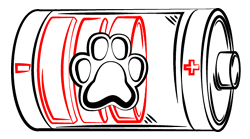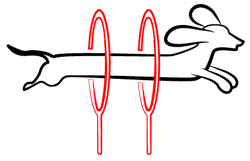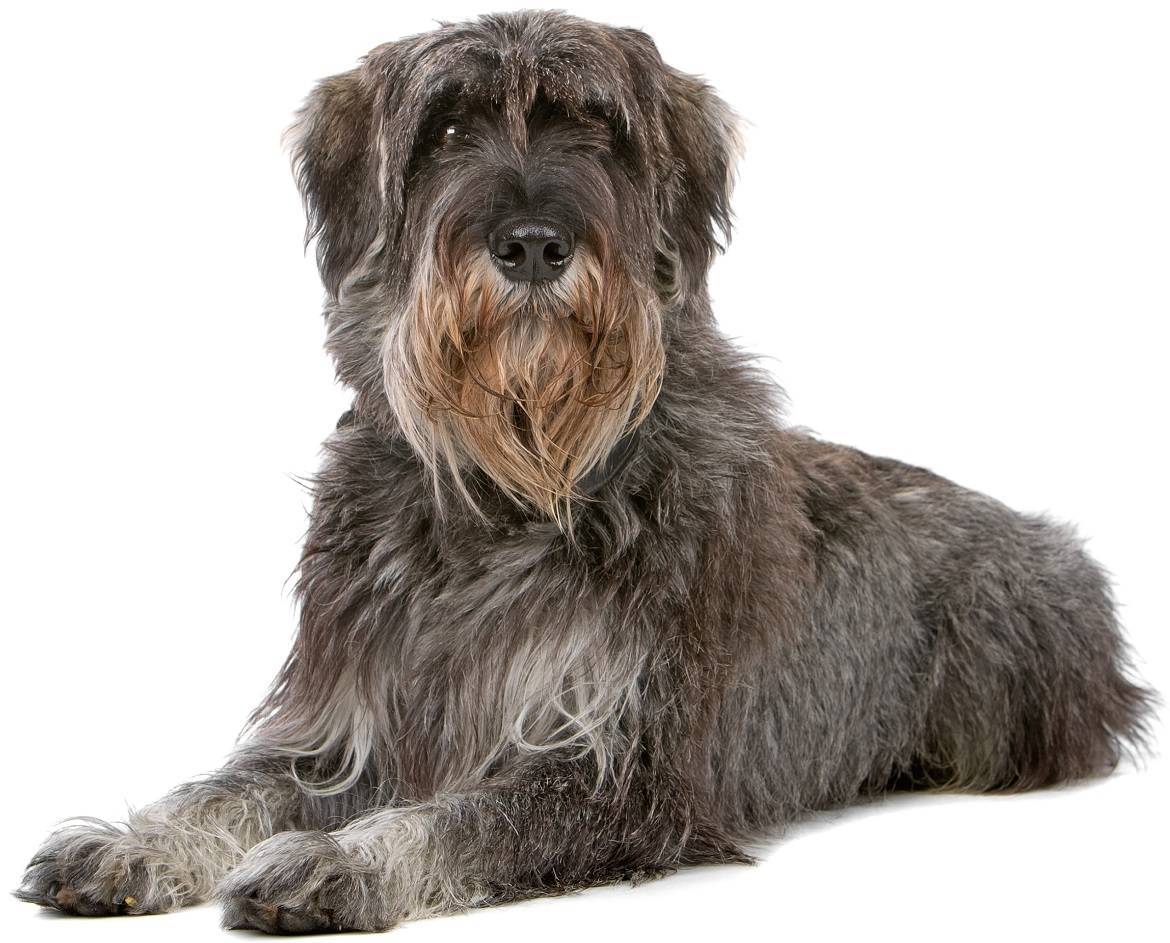
Paws ‘N’ Pups Quickview
Size
| Energy Level
| Trainability
| Paws ‘N’ Pups Rank
|
Characteristics
| Physical Characteristics: Height – Female: 23-26” | Male: 26-28” Weight: 55-110 lbs. Energy Level: Moderate – High | Colors: The American Kennel Club recognizes the Giant Schnauzer in the following colors:
|
Health & Longevity
Average Life Span: 12-15 years
The Giant Schnauzer is often in great overall health, but these pups do have a few minor and serious health conditions that pet owners should look out for. Most Giant Schnauzer puppies are very healthy unless they are born with a defect. In which case, most birth defects in canines are easily corrected with surgical interventions. However, as the Giant Schnauzer ages, he could be prone to developing the usual health complications that could plague any dog of any breed at any time. For example, heartworms, the parvo virus, and some forms of cancer are a few health issues that Giant Schnauzers could develop—just like any canine.
Two breed-specific health conditions that your Giant Schnauzer might encounter include:
Bloat
This life-threatening condition occurs when fluid and gas build up in the stomach, causing the belly to twist and trap the painful gas inside. Symptoms include a swollen, obviously bloated belly, excessive urination, excessive thirst, loss of appetite, hair loss, lethargy, obvious pain, and depression. Surgery is required to relieve the pressure in the stomach.
Joint Dysplasia
This condition is a birth defect that could affect the hips, elbows, and kneecaps. Caused by malformation of bone and sockets, this condition has subtle symptoms that include obvious dislocation, an awkward gait, or a limp that worsens over time. If left untreated, it could cause severe cartilage deterioration, nerve damage, and painful arthritis. Surgical intervention can permanently correct this condition.
Other health issues that you, as a pet owner, should keep a close watch for include hypothyroidism, cataracts, and bleeding disorders. The average Giant Schnauzer has a lifespan range of 12 to 15 years.
Temperament & Train-ability
The Giant Schnauzer can be a bit domineering around small children and other dogs. And these pups are naturally, inherently wary of all strangers. It takes quite a long time to gain their trust. But, when you do get onto their acceptance list, these pups are affectionate, friendly, and spirited.
Socialization is an important part of training your Giant Schnauzer to be accepting and tolerant of children and other dogs. Start from an early age, and make the training sessions fun with plenty of praise, positive reinforcement, encouragement, and rewards. Your goal should be obedience, but in a positive, kind way. Never, ever strike or take out your frustrations on your Giant Schnauzer. These pups are sensitive, and they can turn aggressive if they feel threatened.
Giant Schnauzers need a lot of room to maintain their fitness and health. Apartments are a no-go, but a home with large, spacious rooms and a fenced-in backyard would be ideal. Invest in plenty of toys for him to sling around and chew on, especially as a puppy. And let him out to romp free and dig in the backyard when you get the chance. But keep a close watch on him! These pups have a natural curiosity about the world, and they’ve been known to jump over or dig under fences to explore it.
Grooming
Giant Schnauzers are a joy and relief when it comes to the simplicity of their grooming routine. These pups are low shedders who rarely give off an unpleasant odor, even when they’ve gone without a bath for a while. Their coat is doubled and dense, so you need a short and firm bristle brush to get through both layers. But be gentle. Dogs have sensitive skin beneath their fur, and you don’t want to rip it accidentally.
Brush your Giant Schnauzer 3-4 times a week to prevent mats and remove any excess hair. The most important grooming must-do for a Giant Schnauzer is trimming their beard, eyebrows, and rump hairs. These pups can have lengthy, unruly hairs that grow twice as fast as the rest of their fur. For show dogs, it is especially important to take your Giant Schnauzer to a professional groomer to have him trimmed and neatened.
Other basic care for your Giant Schnauzer includes clipping his toenails every 2-3 weeks, cleaning his ears once a week, brushing his teeth daily, and bathing him every 6-8 weeks.
Diet
Giant Schnauzers require a bit more food than their Standard and Miniature cousins. These pups have big appetites that fuel their energetic nature. How much your pup eats will, of course, depend on their overall size and the advice of your vet. However, on average, a Giant Schnauzer should have 2 ½ cups to 3 cups of dry, high-quality kibble, divided into two meals per day. Again, this is on average and a rough estimate, as every Giant Schnauzer varies in nutritional needs.
The type of dog food you feed your Giant Schnauzer matters. These pups need nutrient-rich kibble, made from a combination of vegetables, whole grains, and lean meats. Check the ingredients label thoroughly, and stay away from by-products and fillers.
Looking for a Giant Schnauzer?
 Find A Giant Schnauzer Breeder |  Giant Schnauzer Puppies For Sale |  Adopt A Giant Schnauzer |
Cost
Before you invest in a breeder, take your search for a Giant Schnauzer to your local animal shelter. Giant Schnauzers are popular pups, so you would likely find a lonely purebred in need of a new, happy, loving home. In which case, there would be an adoption fee that ranges from $75 to $250. Most shelters also offer updated vaccinations, health checks, and a spay or neuter services before you take your new companion home. If you opt for any of these add-ons, the adoption fees could rise between $400 to $550.
In the event you find a reliable, trustworthy breeder, Giant Schnauzer puppies cost between $500 to $1,500. The price, of course, depends on the requirements, expectations, and inclusions of the breeder. For example, a Giant Schnauzer that possesses AKC-certified show qualities and a pure, well-documented bloodline will cost more. Meanwhile, a regular AKC-registered Giant Schnauzer for a companion or family pet will cost towards the lower end of the spectrum.
Paws ‘N’ Pups Ranking
Paws ‘N’ Pups ranks every breed out of 4 with 1 being easiest to integrate into your life and 4 being the toughest – The lower the ranking the better.
Ranking takes into account a few basic factors including cost, skill level needed, high vs low maintenance and how critical regular training is to success. On the Paws ‘N’ Pups ranking scale, the Giant Schnauzer would be a 2. While these pups take a while to bond with their owners, they are protective, friendly, and loving once acceptance has been achieved. Training is a challenge, sure, but positivity, patience, and consistency will win you the heart and obedience of your beloved new companion.
Breeds Similar To Giant Schnauzer
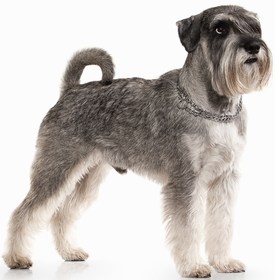 Miniature Schnauzer | 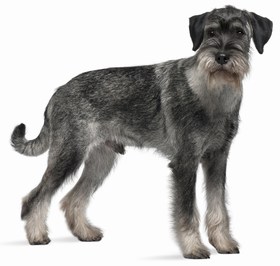 Standard Schnauzer | 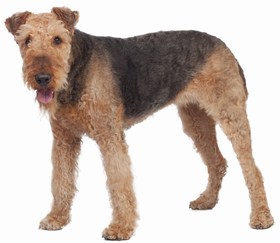 Airedale Terrier | 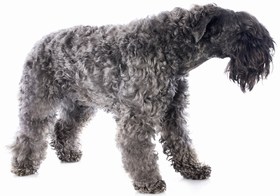 Kerry Blue Terrier |


